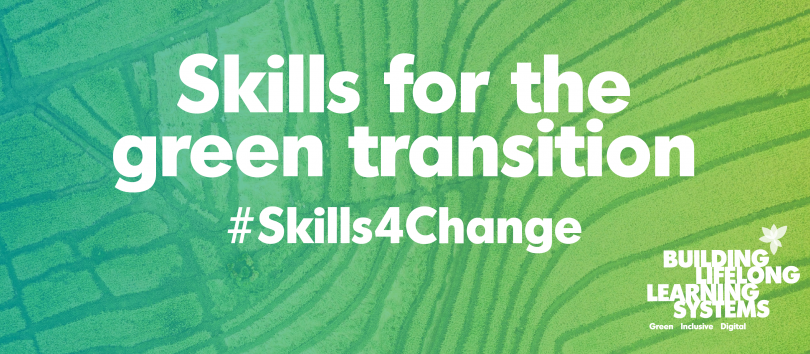
Skills for the Green Transition
Green skills is the focus of the ETF’s April communication campaign. For the whole month, experts and practitioners at national, regional, and international level will share evidence and opinions on green skills and learning and their importance for jobs and growth in the EU's neighbouring regions. Stay tuned to our various channels with #Skills4change.
Crisis as catalyst
Climate change, environmental degradation and loss of biodiversity caused by human activity are among the biggest global challenges of the 21st century. Countries around the world now accept that action is urgently required to address these problems. At the Paris summit in 2015, 196 countries pledged to take action to limit global warming to 2°C above pre-industrial levels and the European Union has pledged to be carbon neutral by 2050.
The COVID-19 crisis has accelerated the process. The radical reduction in international travel and daily commuting to work together with the drop in economic activity has meant many countries have been able to meet and even exceed their emission targets for the first time. In common with other countries around the world, the European Union has decided to seize this opportunity to make environmental sustainability an integral part of its post-COVID recovery plan building on the EU Green Deal. The drive towards clean, carbon neutral, circular economies and societies also shapes EU external assistance to the countries of the neighbourhood.
Green jobs
The green transition means rethinking the way we design, develop, produce, market and distribute goods and services across all sectors of the economy. It will mean the replacement of fossil fuel technologies and the demise of industries, like coal mining or petroleum extraction, dependent on them. It will force people to rethink how we live our lives and consider the environmental impact of everything we do.
This will mean the disappearance of some jobs, the creation of others – not necessarily in the same sectors or the same geographical locations – and the transformation of many more. Motor mechanics, for example, will have to learn to repair and service electric vehicles. Construction workers will have to learn to install solar panels and geothermal heating systems. Farmers will have to learn to apply precision agriculture techniques.
Environmental awareness will become a requirement of all jobs, and indeed an aspect of 21st century citizenship.
Skills for greening
The green transition will not happen if people do not have the awareness, knowledge and skills to drive it forwards. And that means big changes in education, training and lifelong learning. Environmental awareness will need to be mainstreamed in all curricula. Vocational and higher education will have to adapt to the emergence of environmentally friendly technologies in a wide range of professions. Courses will have to be developed for new professional profiles linked to greening, such as energy auditor or sustainability officer or environmental engineer.
Learning for all
The green transition accentuates the need for education and training systems to transition towards lifelong learning. New mindsets and new skills will be needed not only for people entering the labour market, but people of all ages and stages in life. And this regardless of their social and economic status, educational attainment, abilities or disabilities, or geographical location. Everyone has a stake in sustainability, and the green transition must therefore be inclusive of all members of society.
Ecology of skills
Learning must support the green transition. To do so it must be closely aligned with national, regional, local and sectoral greening strategies. This requires close interaction between education and training systems and their environments to build skills ecosystems in which skills development goes hand in hand with economic, technological and social change.
International conference
These issues will be discussed at a major international conference entitled “Building lifelong learning systems: skills for green and inclusive societies in the digital era” to be held online on 21-25 June 2021. Organised by the ETF and UNESCO with the collaboration of UNICEF, the conference will focus on how education and training systems can adapt to the challenges of global change and green and digital futures and guarantee the right to education for all.
Did you like this article? If you would like to be notified when new content like this is published, subscribe to receive our email alerts.